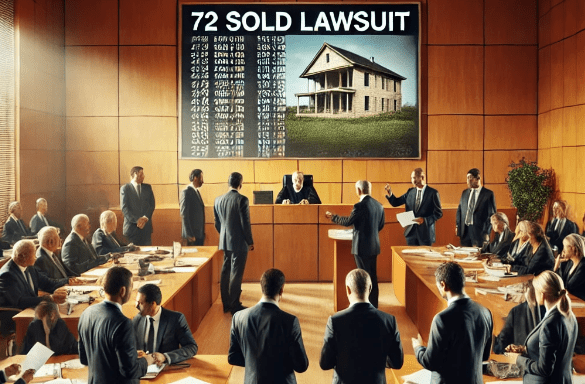72 Sold Lawsuit: What You Need to Know About the Controversy

72 Sold Lawsuit has gained popularity as a real estate program that promises to sell homes quickly and at competitive prices. However, as with many high-profile business models, legal challenges can arise. The 72 Sold lawsuit has drawn attention from both real estate professionals and homeowners, sparking debates about the company’s business practices, transparency, and legality.
This article will break down what 72 Sold Lawsuit is, the details surrounding the lawsuit, the possible implications for homeowners and agents, and what it means for the future of real estate sales.
What is 72 Sold Lawsuit? Understanding the Real Estate Model
1. How 72 Sold Lawsuit Works
72 Sold Lawsuit is a real estate selling program that claims to sell homes in 72 hours or less, often at higher prices than traditional methods.
- Marketing Strategy: The company uses aggressive advertising and online marketing to attract sellers who want a fast and hassle-free home sale.
- Partnerships with Agents: Licensed real estate agents work under the 72 Sold system, following a specific selling process to attract and close deals quickly.
- Alternative to Traditional Selling: Unlike the standard home-selling process, which involves open houses and prolonged negotiations, 72 Sold Lawsuit simplifies the experience by presenting pre-qualified buyers to sellers.
2. Why 72 Sold Lawsuit Became Popular

The concept of a quick, stress-free home sale has made 72 Sold Lawsuit a popular choice among homeowners.
- Speed and Convenience: Many homeowners prefer selling their homes without lengthy listings, showings, or price negotiations.
- Higher Sale Prices: The program claims that homes sell at higher prices compared to the traditional market.
- Marketing Hype: The heavy promotion and testimonials have built strong credibility among some sellers.
However, while the program has been successful for some, others have raised concerns about transparency and business practices, leading to legal challenges.
Breaking Down the 72 Sold Lawsuit: Allegations and Claims
1. What is the Lawsuit About?
The 72 Sold lawsuit stems from allegations regarding the company’s business practices, including:
- Misleading Advertising: Some claim the company’s marketing exaggerates its ability to sell homes faster and at higher prices.
- Unfair Contracts: Allegations suggest that homeowners may be locked into agreements that are not as favorable as advertised.
- Regulatory Violations: Certain lawsuits question whether 72 Sold Lawsuit adheres to real estate regulations and fair business practices.
While the specifics of the lawsuit can vary, the central theme revolves around whether 72 Sold is operating with full transparency and fairness.
2. Who Filed the Lawsuit?
The lawsuit may involve multiple parties, including:
- Homeowners: Some sellers claim they were misled about the selling process and results.
- Real Estate Agents: Certain agents allege that 72 Sold Lawsuit places restrictions or obligations that limit their ability to operate independently.
- Regulatory Authorities: Depending on the legal issues, government agencies could be investigating the company for potential violations of real estate laws.
3. What Are the Potential Legal Issues?
If the lawsuit proves valid, 72 Sold Lawsuit could face legal consequences such as:
- Fines and Penalties: Regulatory agencies could impose fines if the company is found to have violated real estate laws.
- Changes in Business Practices: The company may need to revise its marketing, contracts, or operational methods.
- Compensation for Affected Sellers: Homeowners who feel they were misled could receive refunds or other financial compensation.
The outcome of the case will determine whether 72 Sold Lawsuit must alter its approach or face serious consequences.
How This Lawsuit Affects Home Sellers and Real Estate Agents
1. Home Sellers: Should You Be Concerned?
If you’re a homeowner considering 72 Sold Lawsuit raises important questions.
- Do Your Research: Verify claims made in marketing materials and read contracts carefully before signing.
- Understand the Risks: Quick sales may not always result in the best financial outcome. Ensure you’re getting fair market value for your home.
- Check Legal Updates: If the lawsuit results in policy changes, new rules may affect how homes are sold under the 72 Sold program.
2. Real Estate Agents: What It Means for Your Business
Agents working with or competing against 72 Sold Lawsuit should also take note.
- Compliance Matters: If the lawsuit leads to new real estate regulations, agents may need to adjust their practices accordingly.
- Reputation Concerns: Agents associated with 72 Sold should be aware of how the lawsuit may affect their credibility.
- Exploring Alternatives: If 72 Sold Lawsuit faces operational changes, agents may need to consider other selling strategies or business models.
3. Market Impact: Will the Lawsuit Change Real Estate Sales?
If the lawsuit leads to significant changes, the real estate industry could see shifts in:
- Marketing Practices: Companies may need to be more transparent about their claims.
- Consumer Protections: Regulatory agencies might introduce new guidelines to prevent misleading real estate advertisements.
- Selling Methods: Alternative real estate models like 72 Sold Lawsuit may need to adjust their approach or face stricter oversight.
The lawsuit could set a precedent for how future real estate programs operate.
Expert Opinions: Is 72 Sold Lawsuit a Good or Risky Investment?
1. Supporters’ Perspective
Some real estate professionals and homeowners believe 72 Sold offers a valuable service.
- Fast Home Sales: Many satisfied sellers appreciate the convenience and efficiency of the process.
- Innovative Approach: The company’s business model challenges traditional real estate methods, offering new possibilities for sellers.
- Success Stories: Testimonials from homeowners suggest that 72 Sold has delivered strong results in many cases.
2. Critics’ Perspective
Opponents argue that 72 Sold may not always deliver what it promises.
- Overpromised Results: Some claim that the high selling prices and fast turnover are not as common as advertised.
- Legal Risks: If the lawsuit leads to regulatory action, 72 Sold Lawsuit may have to change its operations significantly.
- Transparency Issues: Critics believe the company should provide more clarity about fees, contract terms, and actual sale results.
3. What’s the Verdict?
Until the lawsuit is fully resolved, homeowners and agents should remain cautious. Conducting independent research and consulting a real estate professional can help you make the best decision.
Conclusion: What’s Next for 72 Sold?
The 72 Sold Lawsuit raises important questions about transparency, business ethics, and real estate marketing. While the company has provided a unique and innovative approach to home sales, legal scrutiny suggests that there may be areas requiring improvement.
For homeowners considering 72 Sold Lawsuit, it’s essential to do thorough research, compare options, and read contracts carefully. Real estate agents should also monitor the case’s outcome, as it may impact the industry as a whole.
As the lawsuit unfolds, the future of 72 Sold remains uncertain. However, this case highlights the importance of accountability in real estate transactions and the need for fair and honest business practices.
Would you still consider selling your home through 72 Sold, or are you waiting for more clarity on the lawsuit’s outcome? Let us know your thoughts!



